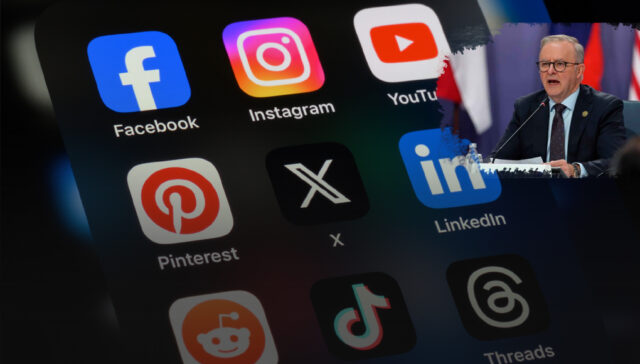Use a VPN, but don’t stop there
The socialist government of Anthony Albanese is, once again, proposing legislation to de-anonymise, monitor and censor the Internet. From across the Tasman Sea in New Zealand I can smell the American eKaren Julie Inman Grant’s enthusiasm for this sort of authoritarian crackdown.
As always the justification amounts to “Please! Won’t Someone Think of The Children!”, along with misdirections concerning child safety and insulating young minds from dangerous misinformation and disinformation. Coded language that really means truths that are inconvenient obstacles for leftist narratives.
Attacks on free speech and Internet privacy are nothing new. Leftists in Western democracies have been endeavouring to implement them for decades. The problem has been public resistance, with opponents able to point to China and its Great Firewall as a handy example of how such initiatives enable totalitarianism.
There are risks associated with all circumvention technologies but that always amounts to getting caught
A massive public relations campaign has been underway across the West for many years, conducted by western governments, aligned NGOs and supra-national organisations such as the WEF, attempting to sway public opinion against the maintenance of civil liberties across the Internet. A recent example is the coordinated attacks upon Elon Musk’s 𝕏 platform, which has largely refused to comply with government demands for censorship and state surveillance of 𝕏 users: censorship and surveillance to which other social media platforms such as Mark Zuckerberg’s Facebook have been only too willing to comply.
Musk’s intransigence has attracted the ire of the authoritarian elites across the world, and not just Australia’s petulant eKaren Julie Inman Grant. From European Union Commissioner Thierry Breton’s jackboot demands for 𝕏 to comply with oppressive provisions of the bloc’s Digital Service (DSA) Act through Brazil’s Justice Alexandre de Moraes banning 𝕏 altogether in the country at the behest of the ruling leftist regime, to French president Emmanuel Macron luring Telegram CEO Pavel Durov to France so he could be arrested, the social media platforms allowing resistance to state censorship and surveillance have been put on notice.
Nonetheless, the attacks on the social media giants are a sideshow. The leftist elites are well aware that compliance by the social media companies does not solve the underlying issue of users themselves circumventing surveillance and censorship on platforms simply by moving to alternative platforms that refuse to comply.
We’re seeing this already as frustrated users flee Facebook en masse for platforms that don’t block their content and suspend their accounts when they post about Hunter Biden’s transgressions. The more adventurous migrate to decentralised platforms (or federated as the terminology goes) that don’t even have a corporation behind them for governments to bully. Remember MySpace? When one social media platform loses prominence, another rises to take its place.
The solution is to impose surveillance and censorship at the source rather than the destination: the users themselves. The preferred approach of the leftist elites is to impose technological restrictions and then to enact punitive punishments against those who circumvent them. Brazil has implemented this, with users caught using a Virtual Private Network (VPN) to access banned sites such as 𝕏 facing fines of up to $US9,800 per infraction. China employs a similar technology/legislation regime though the punishments meted out to transgressors are considerably worse.
What is a citizen opposed to this totalitarian crackdown on basic civil liberties to do? In a democracy the true solution lies at source: cease voting for leftwing political parties that promulgate and promote this hateful ideology. But if you happen to live under such a government such as Australia, there are technical mitigations available too. In recent days I’ve heard chatter similar to “just use a VPN. Everyone will have a VPN app installed on their device in two minutes” to bypass restrictions. It’s not that simple.
Attacks on free speech and Internet privacy are nothing new.
VPNs are great and everyone should use one. They are a trivially easy method of routing your traffic through another country, one with a better commitment to fundamental human rights. The problem is that VPNs are also trivially easy to detect. Detection by the state -such as in Brazil and China- is rapidly followed by state enforcement. I have heard sotto voce that the Australian Labor party intends such a ban on VPNs. Bring on the organ harvesting.
Fortunately for Aussies, people living under other repressive regimes have developed solutions. Technical advances from those on the side of freedom against the enforcement mechanisms of the leftists are in the ascendency, though it must be said there is no such thing as perfect security. The technique with the most value is obfuscation, a method of giving VPN traffic the appearance of being a different type of traffic, making it far more difficult to detect. The most mature and readily-available suite of sophisticated tools to obfuscate Internet traffic is the Tor network, a component of which the leftist elites endeavour to scare you about by using the bogeyman term Dark Net.
Tor works by bouncing traffic from ingress nodes through intermediary nodes to exits nodes back onto the Surface Internet in order to obfuscate the origin, meaning the user. This comes at the cost of additional latency but Tor has an equally valuable feature: the facility to obfuscate the type of traffic with pluggable transports, better known as bridges. Two of the most popular are OBFS4 bridges running on Tor relays and Snowflake, which operates as a simple peer-to-peer browser extension. Alongside VPNs, both of these are technologies Australians would be well advised to utilise.
In the escalating technology war against Internet civil liberties, advances in AI analysis of obfuscated traffic poses the most critical risk. A simple VPN may suffice for Australian Internet users and I recommend using one. Tor is the next step up and you should start using that too. It’s available for all platforms and devices.
There are risks associated with all circumvention technologies but that always amounts to getting caught: following in the footsteps of other oppressive regimes the Australian Labor government is likely to discourage circumvention through VPNs and Tor with punitive penalties.
And as I alluded earlier, technology is merely mitigation. The solution is to vote the nasty bastards enacting these attacks upon civil liberties out of office.








